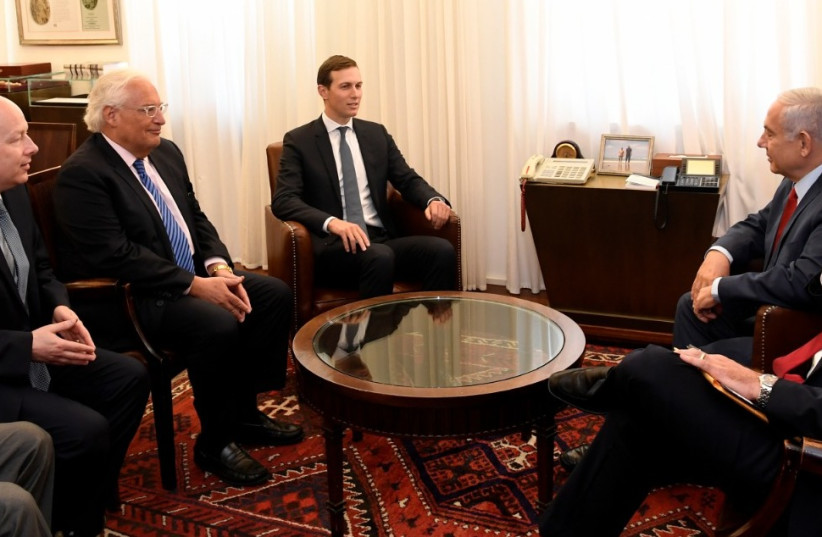When an author of a nonfiction book writes a book proposal, it generally includes a market survey, answering the question of whether other books like this one exist or are in the pipeline, what makes this one unique and who the audience is for the proposed book.
At this point, there is an Abraham Accords book industry. First came Israeli journalist Barak Ravid, who made the questionable marketing move of publishing in Hebrew, but already releasing the biggest scoops in English at that time, almost a year before the English translation of the book is anticipated to be released. Then there was former ambassador to Israel David Friedman. His top adviser, Aryeh Lightstone, published a book this month, as well. Presidential special adviser and son-in-law Jared Kushner’s book is also on the way. Former prime minister Benjamin Netanyahu recently finished writing his memoirs, which will likely include the Abraham Accords and blow all the others out of the water, in terms of sales.
In the Path of Abraham
Before reading In the Path of Abraham, by Trump Organization top lawyer-turned-special representative for international negotiations Jason Greenblatt, the book proposal questions screamed out at me: Who is going to read all of these books, other than someone like me, who has to do it for work?
Greenblatt’s contribution to the genre presents Israel-related events in the Trump administration from his personal vantage point, but with a greater focus on history and policy than Friedman’s Sledgehammer, which was much more of a personal memoir that settled scores with his critics. Of the duo of Orthodox New York-area lawyers that Donald Trump appointed as his Israel team – along with Kushner – Friedman was the more audacious and Trump-like one (though not as brash as Trump, that would be impossible) and Greenblatt was more quiet and behind the scenes, so much so that in the book’s acknowledgments, he apologizes to journalists for not leaking to them. The acknowledgments section, by the way, is unusually long and detailed, which reflects positively on Greenblatt.
Greenblatt is light on behind-the-scenes details, and no juicy headlines jump off the pages. The insider tidbits are things like then-prime minister Netanyahu joining a minyan in the Prime Minister’s Office so that Greenblatt could say the kaddish on his mother’s yahrzeit, the anniversary of her death.

The memoir parts have more to do with his inner monologue, how he managed to keep Shabbat, and his work-life balance – something that was refreshing to see a man grappling with, for a change – than any palace intrigue.
Greenblatt is also very hesitant to say a bad word about anyone. The way Greenblatt tells it, everyone with whom he worked was good at his or her job and he had almost no complaints – even if he ended up doing the opposite of what they said. Everyone’s advice was “meant kindly,” even when it was “dead wrong.” His sharpest barbs are saved for the Palestinians’ “pay-for-slay” program, paying terrorists for attacking Israelis, and Palestinian Authority Mahmoud Abbas’s “truly disgusting” doctoral dissertation, making the spurious claim that the Zionist establishment collaborated with the Nazis.
While critical of Obama administration figures like former secretary of state John Kerry for being stuck in old paradigms for the Middle East even if they clearly didn’t work, Greenblatt doesn’t write like someone who has all the answers. He has confidence in his convictions, together with the modesty of someone who wants to listen and learn.
In other words, if you’re interested in “owning the libs,” as Trump fans say on social media, this is not a book that will scratch that itch. But if you want thoughtful rebuttals of “the libs” and fact-checks of the Obama administration’s statements on the Middle East, then Greenblatt has you covered.
The book has a lot of historic background on the Israeli-Arab conflict and US policy toward Israel and the Middle East, including basic things like that “Mandatory Palestine” does not mean there was a Palestinian state, and what is UNRWA, to the extent that it can be viewed as a beginner’s guide, albeit from a very specific perspective.
And there are a lot of the oft-heard arguments Israel advocates like to make, such as, Israel is the only place in the Middle East where Christians can safely celebrate Christmas. Why is the world so fixated on Israel and the Palestinians when millions of people were being butchered in Syria? And US aid to Israel helps the US as much as it helps Israel, its eyes and ears in the Middle East – plus it’s all spent stateside. They’re all true, but they’re also all well-trod territory.
Given the very basic level of knowledge Greenblatt assumes of his readers, along with just how nice he is on every page, plus his descriptions of the great lengths to which he went in order to observe Orthodox Judaism, Greenblatt’s unique contribution to the Abraham Accords library may be that this is a good gift for a young, religious reader. Having been one myself, I could imagine a civic-minded, American Orthodox Jewish high school or college student being inspired by Greenblatt’s story, that someone who shares their background made it all the way to the White House and was able to do good for America and Israel, without compromising on Shabbat observance and good midot, character.
And maybe that’s the answer to the question about who will read all of these memoirs. I may have to read them all, but the average readers can choose whose version of events they connect to most. This one would make a good gift for sending off a kid to a year in seminary or yeshiva in Israel in September.
In the Path of Abraham
By Jason Greenblatt
Wicked Son
240 pages; $28
